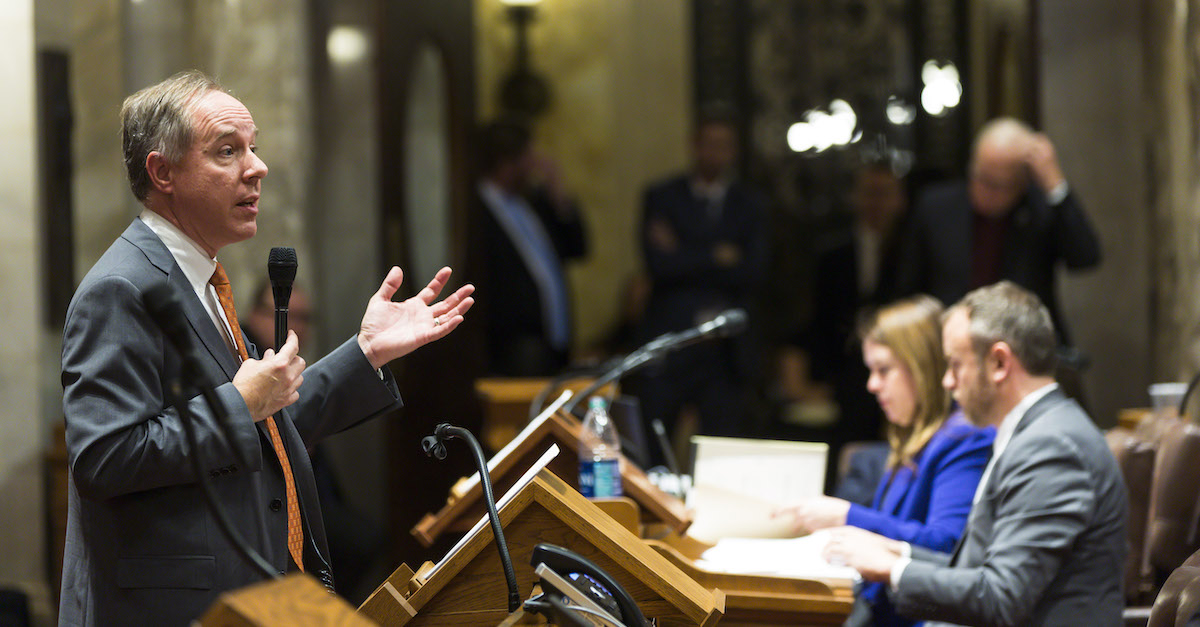
Wisconsin Assembly Speaker Robin Vos (R-Burlington) addresses the Assembly during a contentious legislative session on Dec. 4, 2018 in Madison, Wisconsin.
After suing to block his deposition within 48 hours, Wisconsin Assembly Speaker Robin Vos (R) successfully negotiated a lengthy reprieve from the Jan. 6th Committee’s subpoena seeking him to testify about his recent conversation with former President Donald Trump.
The committee agreed “not to take steps to enforce the subpoena at issue pending resolution of the matter” in court, a process likely to take roughly a month to be fully argued.
During a roughly 30-minute hearing on Tuesday, presiding U.S. District Judge Pamela Pepper set oral arguments in the matter for Monday, Oct. 24.
She said that she would first need to determine whether she has jurisdiction over the case.
The schedule, while brisk, frustrated the Jan. 6th Committee’s intention to depose Vos on time for their previously scheduled public hearing on Wednesday, which itself was postponed by Hurricane Ian’s anticipated landfall in Florida.
On Sunday, Vos sued the committee in the Eastern District of Wisconsin, seeking a speedy temporary restraining order that would block his deposition within 48 hours. Vos said that he received a subpoena on Saturday, Sept. 24, ordering him to appear for a deposition this past Monday, Sept. 26.
According to the state lawmaker’s legal team, the Jan. 6th Committee rushed to get him under oath in order to pull clips for their upcoming hearing.
“The only explanation for such an extreme timeline is the Committee’s desire to conduct the deposition before its next publicly televised hearing on Wednesday, September 28, 2022, so that clips can be edited out to be used in a multimedia show,” the speaker’s legal team wrote in a 24-page complaint. “Importantly, the Committee is not seeking to depose Speak Vos to question him about the breach of the Capitol, the events leading up to January 6, 2021, or the events of the 2020 election. Rather, the Committee is seeking to depose Speaker Vos, with no notice, to ask him about a conversation he had with former President Donald Trump two months ago.”
Vos argues that there is no reason for the committee to grill him about his conversation with Trump this past July, some 18 months after the attack on the U.S. Capitol.
But the Jan. 6 Committee has long maintained that Trump’s assault on U.S. democracy long preceded and post-dated the siege of the Capitol. Trump’s falling out with Vos, previously considered a stalwart loyalist in Wisconsin, demonstrates that position.
After the Wisconsin Supreme Court found most drop boxes used in elections in that state were illegal, Trump reportedly leaned on Vos to retroactively invalidate his defeat by Joe Biden. When Vos resisted that effort, Trump endorsed his primary opponent, a challenge the Wisconsin speaker narrowly survived.
Before that time, Vos entertained Trump’s baseless questioning of the 2020 race and appointed a former conservative Wisconsin Supreme Court justice to act as a so-called “special counsel” to lead a partisan review of the race. That official, ex-Justice Michael Gableman, found “no evidence” of election fraud, a judge found, noting that the probe cost taxpayers more than $1 million.
In a stipulation reached shortly before the hearing, Vos and the committee agreed to start filing legal briefs within weeks. Vos will ask for a preliminary injunction in his initial filing on Oct. 4, and the committee will oppose that on Oct. 11. Attorneys for the Wisconsin speaker will then have until Oct. 17 to reply, according to the stipulation.
In December 2020, Judge Pepper, a Barack Obama appointee, issued a blistering ruling dismissing one of the four so-called “Kraken” lawsuits by Trump allies seeking to overturn Biden’s victory.
“Federal judges do not appoint the president in this country,” Pepper wrote at the time. “One wonders why the plaintiffs came to federal court and asked a federal judge to do so.”
[Image via Andy Manis/Getty Images]